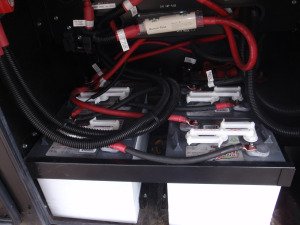How Much Life Can You Get Out Of Your RV Batteries?
Batteries are an important subject to know a little bit about for any RVer.
Inform Yourself & Save Money

After all, they are your machine's life force, and if something goes wrong here you're left without many of the most essential elements of your vehicle. Unlike a car battery, your RV battery is not just used to start your engine and run a couple small lights.
Yet despite this, many owners do not understand how important proper maintenance is on their battery. But by being here, and reading the information below, you are already setting yourself apart in a way that will help make your RV experiences in the future run smooth as a whistle.
How are your batteries holding up? Do you maintain them? Have you replaced them? Have they ever died on you?
Share your thoughts, concerns, stories, or experiences with us and our visitors. We'd love to hear and learn from you.
Some Basic Battery Info
In today's RVs everything relies on 12-volt batteries to function--everything from the roof air conditioner to the refrigerator. Once the roof air conditioner and the refrigerator are turned on they run on 110V, but the computer used to start the air conditioner and refrigerator uses the 12-volt. In addition, your water heater and your furnace are also all 12-volt operated.

Without your batteries in working condition none of these things would work properly and the simplest daily functions in your RV would be impossible to carry out.
The type of batteries in your RV should be deep cycle batteries. This just means essentially that they are designed to store a large amount of power, discharge that power very deeply, and recharge over and over again.
To get the most out of your deep cycle battery and have it last as long as possible before you have to pay for a replacement, you'll want to spend the few minutes it will take to maintain it.
RV Battery Maintenance - Filling With Distilled Water
With proper maintenance an RV battery lasts an average of 5 years. To achieve a longer life span one important thing you'll want to do is keep your batteries full with water (distilled water is recommended).
To get started remove the battery cap and give a look in there. You'll see a tube going into each cell with slits up the sides. These slits allow the gases to flow from cell to cell. Fill until the water touches the bottom of the tube and be careful not to overfill.
If you overfill and cover the slits in the side of each tube you will see liquid oozing from your caps and making a mess of everything around there. Battery trays and connections will all stay cleaner if you take care not to overfill and maintenance is done correctly.
When To Get A New Battery
If the lead plates are not covered in water when you check them chances are good you need to get a new RV battery. At this point, if the battery is not completely ruined then you've at least taken a lot of the life out of it.
The best and most inexpensive way to avoid this problem is to not let the water get that low. If you regularly follow the above maintenance strategies you will maximize the lifespan of your battery and only have to worry about this when it's unpreventable.
Charging Your RV Batteries
There is nothing more important than keeping your battery's connections clean with the above process, but it is also important to keep them consistently charged.
When doing this, keep in mind realistic timeframes to charge up. If your RV batteries are reading low on the monitor, it will take around 72 hours to charge them. If you just charge them for a day, as some owners may do right before a trip, they will only have 1/3 of the total charge.
Think of your batteries as a 5 gallon water bottle. You can pour the water out quickly and easily--that's apparent enough. But imagine the only way you can fill the bottle back up is through a separate hole the size of a pencil. The refilling will take much more time. In other words, it is much easier to drain your batteries than it is to recharge them.
It doesn't hurt your batteries to be low on charge, but it will make your life easier just to keep them charged up.
When storing your RV for two months or more, you will want to make it so your batteries do not discharge. To do this, simply disconnect the ground wire. Your batteries cannot discharge without this ground (unless the battery is already bad, of course).
Dry Camping
If you try dry camping--that is, camping with no electrical hook ups--all you need to do is run your generator three hours in the morning and three hours in the evening and you will be fine forever.
If you don't have a generator consider getting solar power, it works extremely well and I highly recommend it. However, if you don't have a generator or solar power and want to go camping, the key is just to not bring your kids (They never seem to turn a light off! Ha!)
Other Relevant Info
Most RVs have a 2 amp draw (or more) on the engine starting battery even when the batteries are turned off using the auto disconnects. This is the factory setting. I don't like it this way, so don't get mad at you RV technician, it isn't his/her fault.
Having the RV plugged into 110V shore power will not charge the engine battery, so if stored for a long time, disconnect the grounds at the engine battery. They only charge when the engine is running.
NOTE: To all RV owners, if you are plugged into 110V shore power remember to leave your house battery's disconnect on. Batteries won't get a charge if they are off and it overworks your converter charger big time if the disconnect is not on. You should have the engine battery off because remember it won't get charged from the converter anyway.
Enjoy this page? Please help us pay it forward to others who would find it valuable by Liking, Sharing, Tweeting, Stumbling, and/or Voting below.
Have a question about this topic?
Have a question about your RV? Chat with an expert one-on-one now.*
*Chat provided by JustAnswer.com, a third party not affiliated with MSRVR
How Have Your Batteries Held Up?
Has your battery ever run out on you? Do you maintain it? Are you thinking about solar power?
We'd love to hear about your thoughts and experiences, and so would our visitors. Tell us your stories or concerns using the form below, and feel free to include a picture of your RV or motorhome!
Consider Donating?

All questions will be answered in the order I receive them and all are FREE regardless. If you would like to have your question moved to the front of the list or you have received an answer on this site that really saved you some money, please consider supporting the website by making any size donation you’d like. While this site is FREE to you it does cost us time and money to operate. Thanks, and keep the questions coming.
Read More Thoughts About RV Batteries
Click on the links below to read other thoughts and stories about RV batteries. They were all contributed by visitors to this page, just like yourself.
My RV Battery Will Not Hold A Charge
Question: I recently bought a 2002 Jayco Kiwi 23 foot hybrid. So far love it, but noticed that the battery would only last about 6-8 hours, even when …
My RV Battery Is Not Charging... New To RVing
Question: Where is the battery disconnect located? We are new to RVing and are having trouble charging the RV batteries.
Thanks,
RVing in SoCal
…
My RV Battery Not Charging When Plugged Into Campsite
Question: I have a 1997 Coachmen Catalina Sport when I plug my power cord into a campsite after a while I have to turn on the engine on to charge the …
Class A Motorhome Batteries
My motorhome has a disconnect switch for the cabin batteries and a seperate disconnect switch for the engine batteries. I simply turn these to off when …
RV House Battery Problems On Newly Installed Deep Cycle Battery
Question: Just installed new deep cycle house battery and had converter checked. sometimes after unplugging land line to move, the battery indicator …
Outlet Use With Batteries In RV
Question: I have a 2011 outdoors back country 18f. When I unplug the unit from a power source only the radio lights and water pump work. Our dealer said …
Where Is My House Battery In Sprinter Keystone Camper?
Question: I am trying to locate my house battery on my 27 foot 2003 sprinter keystone camper, can you help me?
Robbie: I stopped by one of the …
My RV Batteries Won't Retain Charge For More Than 12 Hours
Question: I have a 2006 Keystone Cougar 28'. The last two times I have had it out the batteries would not hold a charge for more than 12 hours. Usually …
Replaced RV Batteries and Fridge Quit Working???
Question: We were informed we had a "bad house battery" in our 2009 Itasac Suncruiser. The batteries had bubbled over and we had acid dried up in the …
How To Charge RV Coach Batteries
Question: I have a 2002 31ft Fleetwood and switched from 2x12 volt batteries in parallel to 2x6volt in series but they don"t seem to charge. I have …
My Battery Is Dead While Dry Camping
Question: We have been dry camping and we can not get our battery to stay charged. How often do we need to run our truck and for how long to keep the …
Battery Wont Keep Charging With 110 v
Question: We plugged the RV into a 110v outlet but the battery still looses the power. The battery doesn't keep its charge.
Robbie: It could be …
Batteries may be over-charging
Question: My 1994 Avion 5th wheel has 2 batteries. When I open the battery compartment door, extremely hot air rushes out, & the batteries are very hot. …
How Do I Charge My Camper Battery?
Question: Does the battery on a camper get charged from the truck engine or when you plug it in to the outlet does it get charged then?
Robbie: …
How Long Can I Store The RV With The Battery Disconnect On?
Question: How long can I store the RV with the battery disconnect on? In other words, if we aren't going to use the RV for one or 2 weeks or 3 weeks …
Should I Take Out My Coach Battery If I Don't Use The RV Often?
Question: My RV is a 1987 toyota. I use it 3 or 4 times a year, always the same campground so I do not need the coach battery at all. If I take it out …
Getting Power To Fridge From RV Battery
Question: How long will my fridge run w/ a 12 volt battery?
Robbie: Your fridge is designed to be on 12V only when being driven and even then I …
Golf Cart Batteries On An RV
Question: I have golf cart batteries. What's the down side?
Robbie: First of all, 6 Volt batteries are called golf cart batteries because that …
New RV Batteries Only Last 4 Hours
Question: We bought 4 new batteries for our 200 Cardinal fifth wheel. We are camping in the park and the batteries are only lasting 4 hours. What can …
Kind Words From Our Visitors

Hi, I'm Robbie. Welcome to Money-Saving-RV-Repair.com!
Like the name implies, this site is all about helping you save money while keeping your RV in tip-top shape--and that is all about you having the knowledge to do so.
I've been a technician in the RV industry for 30 years, operating out of San Diego, California. And let me tell you, I love my job.
But I also love empowering RVers with the knowledge they need to make the right decision on repairs, or to make the fix themselves--and that, my friend, is the reason for this website. I hope you enjoy.
Or, learn more about me, my RV service practice, & this website here.


